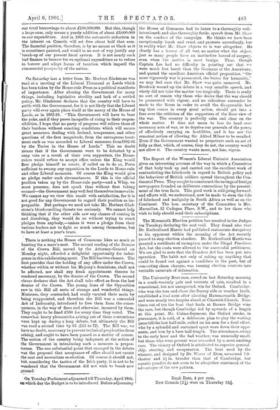. There is nothing the House of Commons likes so
much as hunting for a mare's-nest. The second reading of the Demise of the Crown Bill, moved by the Attorney-General on Monday night, afforded a delightful opportunity for indul- gent* in this exhilarating sport. The Bill has two clauses. The first provides that the holding of any office under the Crown, whether within or without his Majesty's dominions, shall not be affected, nor shall any .fresh appointment thereto be rendered necessary, by the demise of the Crown. The second clause declares that the Act shall take effect as from the last demise of the Crown. The young lions of the Opposition saw in this Bill all sorts of strange and wonderful things. Ministers, they contended, had really vacated their seats by being reappointed, and therefore the Bill was a concealed Act of Indemnity, introduced to free them from the conse- quences, in the way of fines and otherwise, incurred by them. They ought to be fined £500 for.every time they voted. The somewhat heavy pleasantries arising out of these Contentions were kept up during a long debate, but ultimately the Bill was read a Second time by 83 (155 to 12). The Bill was, we have no doubt, necessary to prevent technical perplexities from aXisink, and ought to have been passed as a matter of course. The notion of the country being indignant at the action of the Government in introducing such a measure is prepos- terous. -The one substantial point that emerged in the debate vnui the proposal that acceptance of office should not vacate the 'seat and necessitate re-election. Of course it should not, bit. Considering the tactics* of the Irish party, it is not to be wondered that the Government did not wish to break new ground:






































 Previous page
Previous page